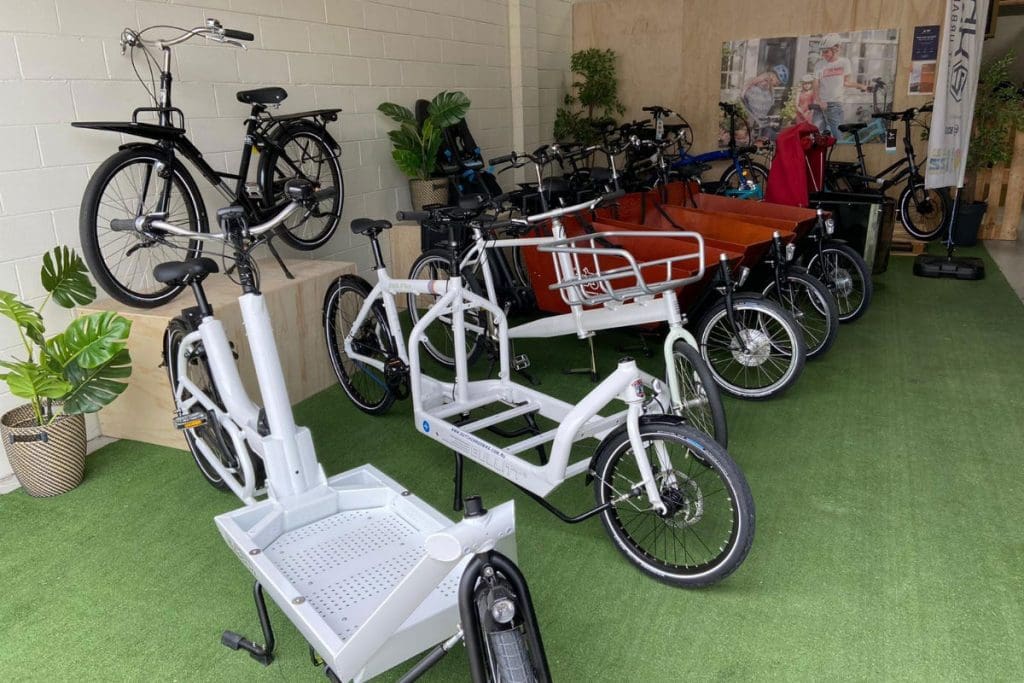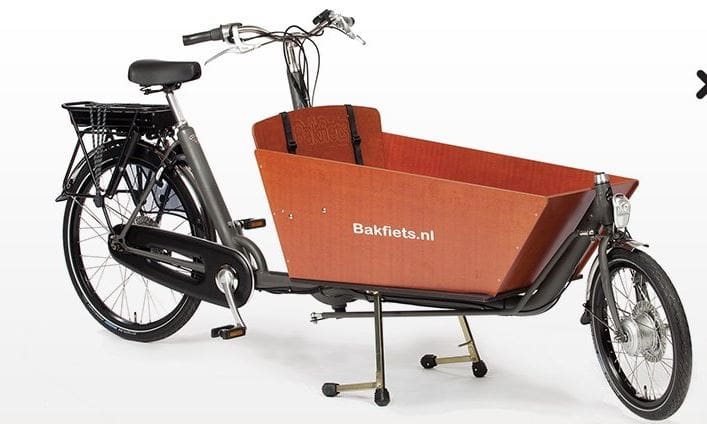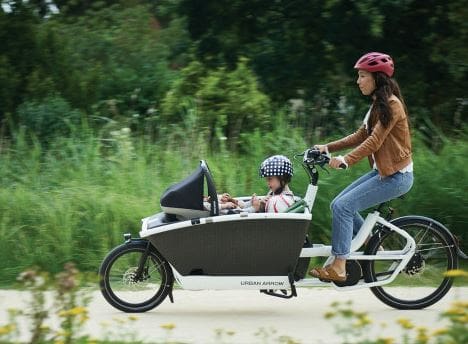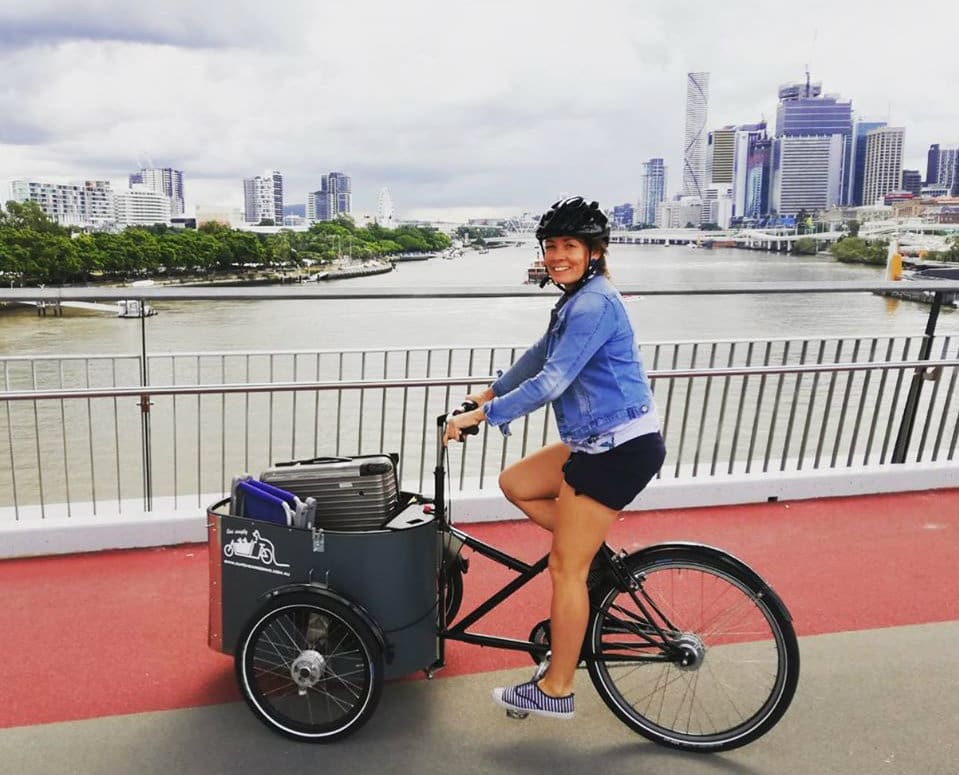Here’s a Big Market Opportunity!

– Sponsored Content –
Electric Cargo Bikes will transform the way people and goods move in urban areas in the decades ahead.
Cargo bikes are not a new invention, but new designs and technology including electric power assistance, has seen the global cargo bike market boom. This in turn means a big opportunity for Australian bicycle retailers looking to stay a step ahead of their competitors.
Often it takes a fresh set of eyes to see potential before the locals realise what’s coming. That’s exactly how Dutch Cargo Bike was born.
As both the company name and the founders’ names suggest, Emmy and Jurgen Heikamp are originally from The Netherlands, but their company is 100% Aussie born and bred.
“We moved to Australia a little over 10 years ago,” Jurgen recalled. “At that time our twins were just six weeks old. I am a technical engineer by trade and came out for a commercial management role. My wife’s background is nursing and health care management. She has a real passion for helping people.
Although the newly arrived Heikamp family soon settled into Australian life in suburban Melbourne, there was at least one essential piece of the Dutch lifestyle that they missed.
“We wanted to buy a two-wheel cargo bike to cycle with our family, but we could not find any good quality cargo bikes in Australia” Jurgen continued. We were really surprised to see people use their cars for everything, even short 1-2-3km distance like dropping the kids to school or getting some groceries. “That’s why we talked to Bakfiets.nl ‘the original’ in the Netherlands and imported a few. One for us and the rest to sell, just to see how it went. The rest is history….

“Dutch Cargo Bike was really niche in the beginning. We were pioneering a new market here.
“We started with Bakfiets.nl bikes. They’re the original two wheel cargo bike in the Netherlands that started about 20 years ago. A year later we decided to take on Bullitt bikes from Larry vs Harry and Nihola Bikes, both Danish brands, hand-built bikes, top of the range, proven concepts.
“We started in our garage where I assembled the first bikes myself with my neighbour and some friends. Later we subleased a proper & larger space. A year ago we finally moved into our own warehouse in Moorabbin. It has our office, workshop, showroom and stock all under one roof, which is efficient.”
Throughout all of this growth Jurgen worked after hours and weekends nurturing in the bike business, while Emmy, now with three young children, primarily ran their growing business on a day to day basis with the help of partners and contractors. It was only early in 2019, that Jurgen decided it was time to leave his corporate role to focus full time on Dutch Cargo Bike.
Dutch Cargo Bike are now preparing to accelerate their growth, which will include expanding their dealer network as part of their 2020-2022 strategic plan.

“It’s about e-mobility and car replacement,” said Jurgen. “We need to find emission free ways of transport in the cities. An e-cargo bike is a true alternative for the car. Therefore the potential is enormous!
“Australia has a big history of cycling as sport, but our business focuses upon bikes for transport.
“We focus on premium brands and quality including Bosch and Shimano electric drivetrains. We believe that bikes should be built to last. The bikes that we bring in should last for a generation or even longer if you maintain them well.
“Good quality means less breakage and repairs required, so less cost in the long run and more cycling! This policy has worked well for us.
“When we started almost 10 years ago, all of our bikes were non-electric and our average sale prices were typically in the $2,000 to $3,000. Today most of our sales are electric cargo bikes with retail prices often between $7,000 and $10.000, some even higher.”
Dutch Cargo Bike still offer their three original brands: Bakfiets.nl, Larry vs Harry and Nihola Bikes. But they’ve also carefully built a complementary range of brands that cover every niche. They are active in six market segments: Kids & Cargo, Urban & Commute, Special Needs, Trail, Business and Couriers, Folding. Dutch Cargo Bike has three main pillars being Import and Distribution, Retail and Service. They carry deep backup stock for their dealers.
Jurgen ran through their newer additions.
“Urban Arrow is a very innovative Dutch company that designed the first “electric only” family bike with a Bosch mid motor. They’re doing really well globally and in Australia.

“Tern Bicycles, which are Taiwanese, were originally folding bike brand. In the past couple of years they have moved significantly towards electric, compact urban, family and cargo cycling. We took Tern over from Bike Box and revamped the brand in Australia in just three years.
“We’ve been successful in reforming the Tern dealer network. We saw a lot of potential in Tern GSD. Tern hit the nail on its head with the rear loading GSD in terms of what was needed to open up the market further.

“Douze Cycles from France are unique products because they can be quickly split into two parts for easy storage or transport in a car if you go on holidays. You can also fit a range of different front end lengths.
“We are importing Riese and Muller electric bikes from Germany with are renowned as being some of the best quality bikes in the world. They have a very wide product range, including some very high end dual suspension cargo bikes”
“Carla Cargo trailers are an innovative German company, they build trailers with a mechanical overrun brake making it possible to carry heavy loads of up to 150kg safely behind a bike.”
Culture Change and Education
No doubt many retailers reading this story would be seeing at last some of these brand names for the first time. But these are far from back yard manufacturers. They have modern factories employing sixty or more staff in some cases, because the European and USA cargo bike market already measures in the hundreds of thousands of units per year.
Dutch Cargo Bike understands its role in the education both for Australian dealers and the broader public.
“So far our dealer base has been mostly specialist bike shops that focus upon urban cycling,” said Jurgen. “There are only a handful of these shops around Australia, but specialty e-bike stores are also on the rise”
“The average Australian bike shop knows all about selling road and mountain bikes to sports orientated riders who are mainly male, but does not have any experience in selling cargo bikes in particular.

“This immediately involves dealing with mothers and young children. It’s a different kettle of fish. It’s a new segment and every segment needs its own sales approach.
“Part of the reason we’ve been successful in this segment is because Emmy is a mother of three. She knows from first-hand experience how to ride with kids. There’s also a lot of technicalities with cargo bikes. There are three wheelers, two wheelers, front loaders, rear loaders, mid tails and long tails, 20, 24 and 26 inch wheels… and they’re all very different bicycles.
“Many customers who come to us saying, ‘I want a trike, because I’m going to ride with my kids and it needs to be stable!’ But after they actually ride a three wheeler and a two wheeler, 75 percent of those people buy a two wheeler.
“Two wheelers have dynamic stability and are lighter and faster to pedal around.
“The Tern GSD has made the family cargo bike sector more accessible, because parents look at the rear loading GSD and think, ‘I can do this!’.
“When they first look at an Urban Arrow or a Bakfiets.nl cargo bike and think, ‘I can’t do that.’ But if they come to our test centre and ride them, 50% end up buying a front loading bike like those ones. People are generally very surprised how well the cargo bikes handle.
“Front loading cargo bikes are safer. You can see your kids, they can see you. You can talk to each other. The kids learn from being ferried through the city and the traffic. It helps them become good safe cyclists later in life.
“Of course, the more people on cargo bikes, the better. But the more people on the right cargo bikes, is even better for the market as a whole and its potential growth.”
In the same way that Dutch Cargo Bike has been successful because it has invested in a wide range of brands and models, Jurgen thinks that dealers will need to make a serious consideration & commitment in order to reap the benefits of this high value sector in the long run. This is an opportunity and we are still in the innovator stage of the adaptation cycle.

“To be successful in the cargo bike sector, dealers need to offer choice,” he stated. “If they only have one bike on the floor, the chances of that being the right bike for the customer who walks into the shop is just too small.
“Because no one really knows much about cargo bikes yet, trying them out is very important. So shops that do well have both choice and let the customers test ride the different styles of bike with their cargo or kids.
We think that they’ll need to devote at least 10 to 15 square metres of floor space and have about four or more bikes on the floor, one or two of each type.
“We understand that this requires a significant portion of space in many dealers’ stores and we think this is the main challenge in Australia.

“For the cargo bikes to really take off, ebikes have to be the ‘new normal’. In Europe that has already happened and it’s starting to happen in the USA. Australia is lagging however Jurgen and Emmy are 100% confident the trend will arrive here soon.
“Twenty years ago when they started selling ebikes in Holland, an ebike was for your grandfather. It was seen as only for people who were too weak to ride a regular bike. People made jokes about it. ‘You’re cheating!’
“Now they know it’s not cheating, it’s actually quite nice because they can go further and they still get good exercise. These days in the Netherlands even kids go to school on ebikes.
“Once ebikes are normal, cargo bikes are next!
“People suddenly realise that they could do all of their shopping, not just a few items. Or take their kids to school and ride right up to the school yard rather than struggle to find a car park in the crazy Australian school rush hour twice a day.
“So very soon the Australian market will be even more ready for cargo bikes than it is today. “Yes, it takes a bit of time, and Australia is behind Europe and the USA, but if dealers want to get in ahead of their competitors now is a good time to start.
“Once we get to the steep part of the growth curve, we expect to see 50% to 100% growth year on year. Sure, we’re coming off a low base in terms of actual cargo bikes sold, and that rate of growth won’t last forever, but those dealers who lay the groundwork now in terms of learning about the products and how to sell them, will be perfectly positioned to cash in on this growth while their competitors are struggling to catch up.
“We’re looking at the top 25 cities in Australia by population. We’re only looking for one good dealer in each city, apart from the very largest cities, where we will want a few more by 2022.”

New Business Opportunities
Dutch Cargo Bike currently has 20+ dealers across the continent. They are open to expansion and will support each dealer to become as successful as possible.
“The dealer margins are very healthy considering high dollar values of the bikes.
“I think there’s also huge potential for making money through servicing cargo bikes and ebikes in the future. The people buying these bikes are not traditional ‘bike people’. They don’t know how to do the most basic repairs and some don’t even inflate their own tyres.
So there’s going to be a real need for premium ebike service which will be an important new revenue stream for the retailers. “We’re also focusing on the business sector: freight, couriers, fleet management.” “There will be a lot of new business opportunities in the cargo bike market,” Jurgen predicted.
For more information, please visit www.dutchcargobike.com.au, email info@dutchcargobike.com.au call 0458 858 713 or 0429 260 514 or visit the shop at Unit 3, 273-275 Wickham Rd, Moorabbin, Vic.
